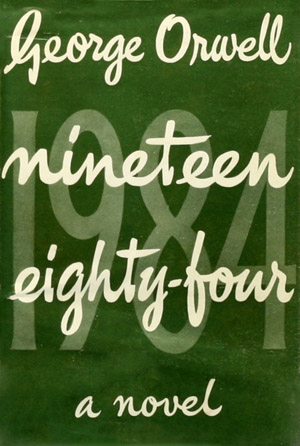Gettysburg professors reflect on the return to dystopian classics
By Daniella Snyder ’18, Editor in chief
Coinciding with the presidential inauguration and recent executive orders, Americans have turned to novels they might have read in high school: dystopian novels like 1984 and Animal Farm.
Current political events have sparked a spike in sales, news outlets like CNN and The New York Times report. At the Women’s March three weeks ago, references were made to Margaret Atwood’s A Handmaid’s Tale, a novel published thirty-two years ago depicting a society in which women are stripped of civil rights. Posters proclaiming “Make Margaret Atwood Fiction Again!” attracted attention, according to The New York Times.
Publishers were left unprepared for the high demand. Some editions of these futile fictions remain sold out on the websites of Barnes & Noble and Amazon.
Several Gettysburg College English professors offered thoughts on why readers are choosing A Handmaid’s Tale instead of Pride & Prejudice.
It makes sense why interest in 1984 rose following the controversy surrounding the comment Kellyanne Conway made regarding Sean Spicer’s “alternative facts”, according to professors Christopher Fee and Leonard Goldberg. In 1984 “alternative facts” were simply considered “Newspeak”, a political weapon in which those in power use language to define the reality for the rest of society.
Leonard Goldberg, Gettysburg College English professor, said the idea of “Newspeak” is 1984’s most important theme.
“While falseness in language is scarcely a new political phenomenon, it is important for modern readers to ask whether ‘alternative facts’ and ‘The Bowling Green Massacre’ might not have been foreseen in it,” he said.
Professor Christopher Fee shared a similar sentiment: “Each novel represents a special set of anxieties … Orwell, of course, takes as his central topic life in a totalitarian state with the power to control more than people’s minds, actions, and feelings. He is talking about concrete modes and methods of what we might term ‘deep propaganda,’ ways of controlling not just the news organizations and the history books but our very ways of formulating truth and morality.”
“It is terrifying because it is EXACTLY the depths to which totalitarian regimes really aspire, and even seeing slight references is enough to set off alarm bells for anyone concerned about free speech, due process, and the rule of law,” Fee remarked.
Professor Sarah Sillin teaches The Hunger Games in her introductory English classes, and she commented that her class discussions on the novel have become political and involved with current events, as students begin to see parallels and connections to dystopian fiction and class conflict in America.
While Professor Elizabeth Duquette plans to teach an entire first year seminar on dystopian literature this coming fall, Professor Temma Berg argues that everything she teaches has become political, even if the class discussion focuses on Hamlet.
However, while Orwell scholars for The New York Times claimed that dystopian literature is gaining popularity as a means to grapple with a new reality we, as Americans, have never faced, Berg remarks, “I can’t really remember a time that was not turbulent. We always read dystopian literature.”
She continued: “Dystopian literature is there to raise awareness and warn us as readers for what could happen, but it also serves as a comfort to remind readers that things could be much worse. It is a false comfort, however, and we must consider how bad things could actually become.”

